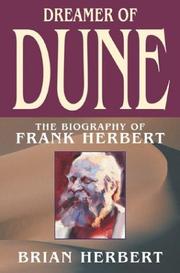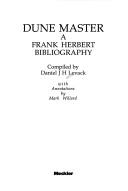| Listing 1 - 9 of 9 |
Sort by
|

ISBN: 9780765306470 Year: 2003 Publisher: New York : Tor,
Abstract | Keywords | Export | Availability | Bookmark
 Loading...
Loading...Choose an application
- Reference Manager
- EndNote
- RefWorks (Direct export to RefWorks)
Book
ISBN: 9782100815036 2100815032 Year: 2020 Publisher: Malakoff: Dunod,
Abstract | Keywords | Export | Availability | Bookmark
 Loading...
Loading...Choose an application
- Reference Manager
- EndNote
- RefWorks (Direct export to RefWorks)
"Oeuvre d'une ambition folle, Dune a ému et fasciné des générations de lecteurs et reste à ce jour le roman de science-fiction le plus vendu au monde. Lire (et relire) Frank Herbert, c'est se plonger dans un univers d'une richesse inégalée, qui a inspiré des artistes aussi différents que George Lucas, David Lynch ou Alejandro Jodorowsky. Un chef-d'oeuvre intemporel, dont les thématiques restent d'une actualité brûlante : politique, écologie, transhumanisme, féminisme…À l'heure où ce planet opera mythique fait son grand retour dans les salles obscures, Nicolas Allard nous guide dans une oeuvre complexe et foisonnante, et nous offre toutes les clés permettant de décrypter ce monument de la pop culture ! Les encres de Chine d'Emmanuel Brière Le Moan disséminées au fil de l'ouvrage complètent l'immersion dans les sables d'Arrakis." -- [éditeur]
Herbert, Frank (1920-1986). --- Authors, American --- American literature --- History and criticism. --- Herbert, Frank.
Book
ISBN: 9782843449727 2843449723 Year: 2020 Publisher: Saint-Mammes: Le Bélial,
Abstract | Keywords | Export | Availability | Bookmark
 Loading...
Loading...Choose an application
- Reference Manager
- EndNote
- RefWorks (Direct export to RefWorks)
"Dix spécialistes, scientifiques, philosophes et linguistes se penchent sur le chef-d'oeuvre de Frank Herbert et dissèquent l'un des plus grands monuments de la science-fiction mondiale. Ecologie, biologie, histoire des religions, astronomie, science politique ou chimie : de l'épice de longue vie aux fameux vers géants des sables, des mystères des Fremen aux arcanes de l'ordre féminin du Bène Gesserit en passant par les pouvoirs de la Voix, DUNE révèle ses secrets sous le prisme de la science !"
Science-fiction américaine. --- Sciences --- Vulgarisation. --- Herbert, Frank (1920-1986). --- Authors, American --- Science fiction, American --- Herbert, Frank.
Book
ISBN: 0822004194 Year: 1975 Publisher: Lincoln, Neb. : Cliffs Notes,
Abstract | Keywords | Export | Availability | Bookmark
 Loading...
Loading...Choose an application
- Reference Manager
- EndNote
- RefWorks (Direct export to RefWorks)
Herbert, Frank, --- Criticism and interpretation --- Critique et interprétation

ISBN: 0887360998 Year: 1988 Volume: 2 Publisher: Westport, CT : Meckler,
Abstract | Keywords | Export | Availability | Bookmark
 Loading...
Loading...Choose an application
- Reference Manager
- EndNote
- RefWorks (Direct export to RefWorks)
Science fiction, American --- Dune (Imaginary place) --- Bibliography --- Herbert, Frank --- Bibliography.
Book
ISBN: 9780812697155 0812697154 Year: 2011 Publisher: Chicago, Ill. : Open Court,
Abstract | Keywords | Export | Availability | Bookmark
 Loading...
Loading...Choose an application
- Reference Manager
- EndNote
- RefWorks (Direct export to RefWorks)
Book
ISBN: 3963173025 3963178515 Year: 2022 Publisher: Büchner-Verlag
Abstract | Keywords | Export | Availability | Bookmark
 Loading...
Loading...Choose an application
- Reference Manager
- EndNote
- RefWorks (Direct export to RefWorks)
Frank Herbert’s »Dune« (1965) is considered to be one of the most successful Science Fiction novels of the 20th century. It introduces its readers to a future universe, in which the production of the most valuable resource of the universe – ›spice‹ – is only possible on one vast desert planet called Arrakis. »Dune« offers many different motifs, including a hero that eventually turns into a superhuman being. However, the novel is also rich of orientalist semiotics and relates to a sign system existent when Herbert wrote his book. Frank Jacob discusses these semiotics in detail and shows how much of »Lawrence of Arabia« is present in the story’s plot.
Semiotics. --- Orientalism. --- East and West --- Semeiotics --- Semiology (Linguistics) --- Semantics --- Signs and symbols --- Structuralism (Literary analysis) --- Herbert, Frank. --- Lawrence of Arabia; Frank Herbert; Paul of Arrakis; Paul Atreides; colonialism; Dune; human collectivism; human-animal relations; T.E. Lawrence; political elitism; semiotics; science fiction; Denis Villeneuve; cross-generational audience; ecology; desert planet; religion; orientalism
Book
ISBN: 3031139348 3031139356 Year: 2022 Publisher: Cham : Springer International Publishing : Imprint: Palgrave Macmillan,
Abstract | Keywords | Export | Availability | Bookmark
 Loading...
Loading...Choose an application
- Reference Manager
- EndNote
- RefWorks (Direct export to RefWorks)
This book offers a critical study of Frank Herbert’s Dune (1965), the world’s bestselling science fiction novel. Kara Kennedy discusses the novel’s exploration of politics and religion, its influential ecological messages, the focus on the human mind and consciousness, the complex nature of the archetypal hero, and the depiction of women’s influence and control. In Dune, Herbert demonstrated that sophistication, complexity, and a multi-layered world with three-dimensional characters could sit comfortably within the science fiction genre. Underneath its deceptively simple storyline sits a wealth of historical and philosophical contexts and influences that make it a rich masterpiece open to multiple interpretations. Kennedy’s study shows the continuing relevance of the novel in the 21st century due to its classic themes and its concerns about the future of humanity, as well as the ongoing nature of issues such as ecological disruption and conflicts over resources and religion. Kara Kennedy is a researcher, writer, and educator in the areas of science fiction, digital literacy, and writing. She is an avid scholar of Dune who has lectured and published on various topics including world-building. She posts literary analyses of Dune for a mainstream audience on her blog DuneScholar.com. She is the author of Women’s Agency in the Dune Universe: Tracing Women’s Liberation through Science Fiction (Palgrave Macmillan 2021).
Science fiction, American --- History and criticism. --- Herbert, Frank. --- Herbert, Frank --- Criticism, interpretation, etc. --- Characters. --- American science fiction --- American fiction --- Kherbert, Frėnk --- הרברט, פרנק --- Herbert, Franklin Patrick, --- Fiction. --- Literature --- Feminism and literature. --- Ecocriticism. --- Popular Culture. --- Medicine and the humanities. --- Motion pictures. --- Television broadcasting. --- Fiction Literature. --- Feminist Literary Theory. --- Medical Humanities. --- Film and Television Studies. --- Philosophy. --- Telecasting --- Television --- Television industry --- Broadcasting --- Mass media --- Cinema --- Feature films --- Films --- Movies --- Moving-pictures --- Audio-visual materials --- Performing arts --- Humanities and medicine --- Humanities --- Culture, Popular --- Mass culture --- Pop culture --- Popular arts --- Communication --- Intellectual life --- Mass society --- Recreation --- Culture --- Ecological literary criticism --- Environmental literary criticism --- Criticism --- Literature and feminism --- Literature and philosophy --- Philosophy and literature --- Fiction --- Metafiction --- Novellas (Short novels) --- Novels --- Stories --- Novelists --- History and criticism --- Women authors --- Theory --- Philosophy --- Popular culture.
Book
ISBN: 9783030892050 9783030892067 9783030892074 9783030892043 3030892050 3030892042 Year: 2021 Publisher: Cham Springer International Publishing AG
Abstract | Keywords | Export | Availability | Bookmark
 Loading...
Loading...Choose an application
- Reference Manager
- EndNote
- RefWorks (Direct export to RefWorks)
This book undertakes the first large-scale analysis of women’s agency in Frank Herbert’s six-book science fiction Dune series. Kara Kennedy explores how female characters in the Bene Gesserit Sisterhood—from Jessica to Darwi Odrade—secure control and influence through five avenues of embodied agency: mind-body synergy, reproduction and motherhood, voices, education and memory, and sexuality. She also discusses constraints on their agency, tensions between individual and collective action, and comparisons with other characters including the Mentats, Bene Tleilaxu, and Honored Matres. The book engages with second-wave feminist theories and historical issues to highlight how the series anticipated and paralleled developments in the women’s liberation movement. In this context, it addresses issues regarding sexual difference and solidarity, as well as women’s demand to have control over their bodies. Kennedy concludes that the series should be acknowledged as a significant contribution to the genre as part of both New Wave and feminist science fiction. Kara Kennedy is a researcher, writer, and educator in the areas of science fiction, digital literacy, and writing. She is an avid scholar of Dune who has lectured and published on various topics including world-building. She posts literary analyses of Dune for a mainstream audience on her blog DuneScholar.com.
Philosophy --- Sociology of culture --- Sociology of the family. Sociology of sexuality --- Fiction --- American literature --- Literature --- populaire cultuur --- filosofie --- literatuur --- gender --- fantasie (verbeelding) --- America --- Women in literature. --- Feminism in literature. --- Woman (Christian theology) in literature --- Women in drama --- Women in poetry --- Feminist theory in literature --- Herbert, Frank. --- Herbert, Frank --- Kherbert, Frėnk --- הרברט, פרנק --- Herbert, Franklin Patrick, --- Science fiction, American --- History and criticism. --- Criticism and interpretation. --- Characters. --- American science fiction --- American fiction --- Fiction. --- Feminism and literature. --- Popular Culture. --- Women --- Sex. --- Fiction Literature. --- Feminist Literary Theory. --- North American Literature. --- Women's History / History of Gender. --- Gender Studies. --- Gender (Sex) --- Human beings --- Human sexuality --- Sex (Gender) --- Sexual behavior --- Sexual practices --- Sexuality --- Sexology --- Feminism --- Manners and customs --- Culture, Popular --- Mass culture --- Pop culture --- Popular arts --- Communication --- Intellectual life --- Mass society --- Recreation --- Culture --- Literature and feminism --- Literature and philosophy --- Philosophy and literature --- Metafiction --- Novellas (Short novels) --- Novels --- Stories --- Novelists --- Philosophy. --- Literatures. --- History. --- Women authors --- Theory
| Listing 1 - 9 of 9 |
Sort by
|

 Search
Search Feedback
Feedback About UniCat
About UniCat  Help
Help News
News